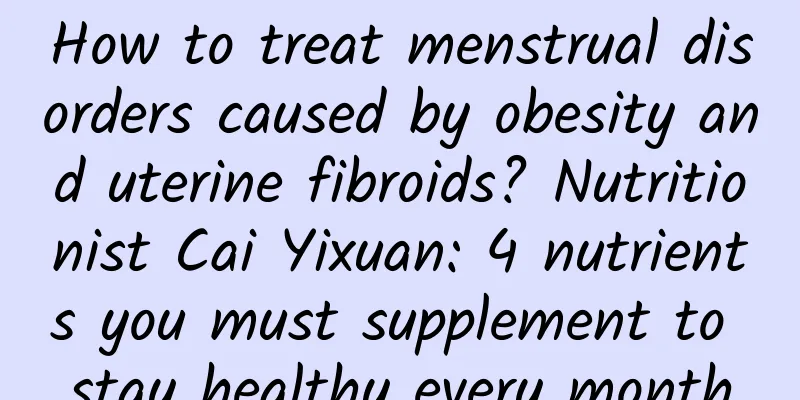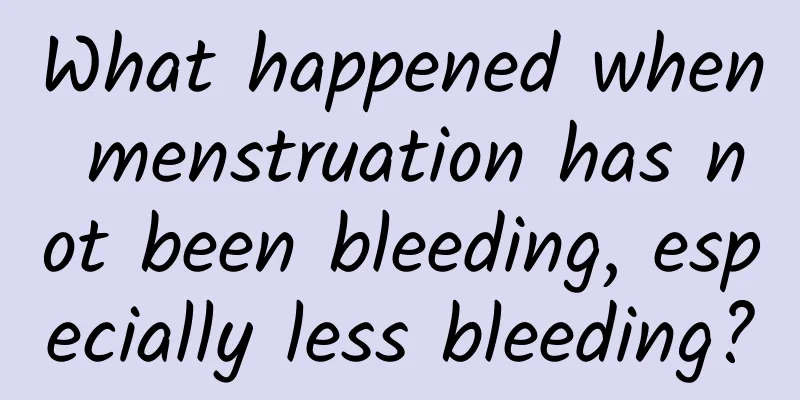How to treat menstrual disorders caused by obesity and uterine fibroids? Nutritionist Cai Yixuan: 4 nutrients you must supplement to stay healthy every month

|
When women have their period, they are most worried about menstrual disorders, which may include scanty menstrual blood flow, irregular menstruation, amenorrhea or incomplete menstruation. Nutritionist Cai Yixuan said that there are many reasons for menstrual disorders, such as uterine fibroids, endometriosis and other diseases, stress, or obesity and being too thin. To avoid menstrual disorders, there are four essential nutrients. Obesity, being too thin, illness, and stress can all lead to menstrual disorders.There are many reasons for irregular menstruation in girls, such as illness, stress, obesity, or being too thin, which can lead to irregular menstruation: Disease: Uterine fibroids, endometriosis, polycystic ovary syndrome or some infectious diseases may lead to irregular menstrual cycles and irregular menstruation. Stress: The body's endocrine system is mostly regulated by the "hypothalamus" in the brain to secrete hormones from the "pituitary gland". When the rest period is irregular and the stress is too great to adjust, it will interfere with the function of the hypothalamus and pituitary gland in the brain, thereby affecting ovulation and menstruation. Being too fat or too thin: If you are too fat or too thin, your body fat percentage will change. When your body fat is too low, it will affect the function of hormones, causing menstrual cycle disorders or even amenorrhea. Obesity will affect ovarian function and is related to sexual function, fertility, and menstrual cycle abnormalities, while high body fat will affect estrogen secretion and affect ovulation. Therefore, women should maintain an ideal body weight (BMI=18.5~24) and keep body fat between 17~27% (17~24% for those under 30 and 20~27% for those over 30). Lack of 4 nutrients can also cause menstrual disordersIn pursuit of a slim figure, many women will take more drastic weight loss measures, such as dieting, very low-calorie diets, or eating only specific foods. Although this can help reduce weight in a short period of time, it may lead to the aforementioned low body fat or malnutrition. The lack of these nutrients in the body is also one of the causes of irregular menstruation. Understanding blood-forming nutrients: iron, folic acid, B12"Iron" is an important nutrient present in hemoglobin that is responsible for transporting oxygen and maintaining the normal function of hematopoietic tissue. If it is deficient, it will cause the synthesis of hemoglobin and red blood cells. "Folic acid" and "vitamin B12" are important nutrients that allow embryonic cell red blood cells to divide and synthesize new DNA. When these two nutrients are lacking, red blood cells will continue to expand like a balloon that is desperately being inflated, becoming particularly fragile and easy to rupture, with a shorter lifespan and a reduced number of red blood cells. Therefore, if these three major hematopoietic nutrients are lacking, the amount of menstrual blood may be less during menstruation. Women should pay special attention to the intake of these nutrients. "Iron" is an important nutrient present in hemoglobin that is responsible for transporting oxygen and maintaining the normal function of hematopoietic tissue, helping to maintain physical health and normal menstrual periods. Iron: "Iron" is an important nutrient present in hemoglobin that is responsible for transporting oxygen and maintaining the normal function of hematopoietic tissue, helping to maintain body health and normal menstrual periods. Food sources of iron include meats such as beef, duck, goose, and lamb; and plant foods include spinach, kale, seaweed, oats, pumpkin seeds, cashews, etc. Folic acid: A lack of folic acid will prevent red blood cells from dividing normally. In addition to iron, the formation of red blood cells also requires the synergistic effects of folic acid and vitamin B. It is recommended to supplement 400 micrograms of folic acid a day. Food sources of folic acid: liver, whole-grain cereals, beans, green leafy vegetables, eggs, etc. B12: Lack of vitamin B12 can easily cause dizziness and drowsiness during menstruation, so moderate B12 supplementation is needed. Food sources of B12: Animal foods such as liver, eggs, poultry, seafood, etc. Calcium : Lack of calcium causes uterine contractions, which may aggravate menstrual pain and discomfort, and also affect the shedding of the uterine lining and the discharge of menstrual blood. Food sources of calcium: milk, dairy products, dried fish, black sesame, white sesame, frozen tofu, small square dried tofu, etc. If you are a vegetarian, in addition to consuming more dried tofu and bean curd, the calcium content of vegetables such as red amaranth, kale, and mountain celery is no less than that of milk. In addition, a moderate amount of protein and sufficient vitamin D can also help improve the calcium absorption rate. Therefore, don't forget to get 10 to 15 minutes of sun exposure every morning or evening to ensure that your body has enough vitamin D! [Nutritionist's Tips]: Nutritionist Cai Yixuan reminds us that nutrients have a certain relationship with the quality of life and menstrual blood volume during menstruation. However, if you have symptoms such as long-term menstrual disorders, amenorrhea or severe dysmenorrhea, you should still seek help from a gynecologist as soon as possible to determine whether you are pregnant, or have other physical or psychological stress or gynecological diseases. 👉Recommended reading: Prevent reflux of menstrual blood during menstruation and avoid endometriosis! Traditional Chinese Medicine Practitioner Lai Ruixin: Don’t commit these three NG behaviors 👉Recommended reading: Anal pain may be caused by endometriosis! Understand the 8 symptoms! Chinese medicine practitioner Wu Wanrong: Avoid these four dietary landmines VIP Selected Products Latest health knowledge |
Recommend
How long does it take to cure bacterial vaginosis?
The pathogen of bacterial vaginitis is vaginal ba...
Body shaping! Pelvic correction with a cloth pillow
In the practical section, we introduced how to co...
It is important to prevent cervicitis and do a good job of contraception
Cervicitis is one of the common gynecological dis...
Experts analyze several pain relief methods for painless abortion
Painless abortion is a method of abortion that is...
What are the factors that cause vaginitis?
What are the factors that induce vaginitis? Do yo...
Don't give ovarian cysts a chance!
Ovarian cysts are a type of ovarian tumor in a br...
Reasonable exercise can effectively prevent pelvic inflammatory disease
Pelvic inflammatory disease is a common gynecolog...
How to take good care of congenital absence of vagina in life
I believe everyone knows that there are many symp...
How to treat second degree cervical erosion?
How to treat second degree cervical erosion? Seco...
Are there many cases of threatened abortion being cured?
What mothers are most worried about in early preg...
What are the causes of ovarian cysts in pregnant women?
Ovarian tumors are common tumor diseases of the f...
The cause of cervical hypertrophy can cause collagen fiber hyperplasia in the female uterine myometrium
The simple cause of cervical hypertrophy will not...
What should I pay attention to after hysteroscopy?
Hysteroscopy is a very common gynecological exami...
What are the hazards of common cervical warts
Cervical warts are a sexually transmitted disease...
What are the early symptoms of habitual miscarriage? Let's learn about it
The occurrence of habitual miscarriage often has ...









